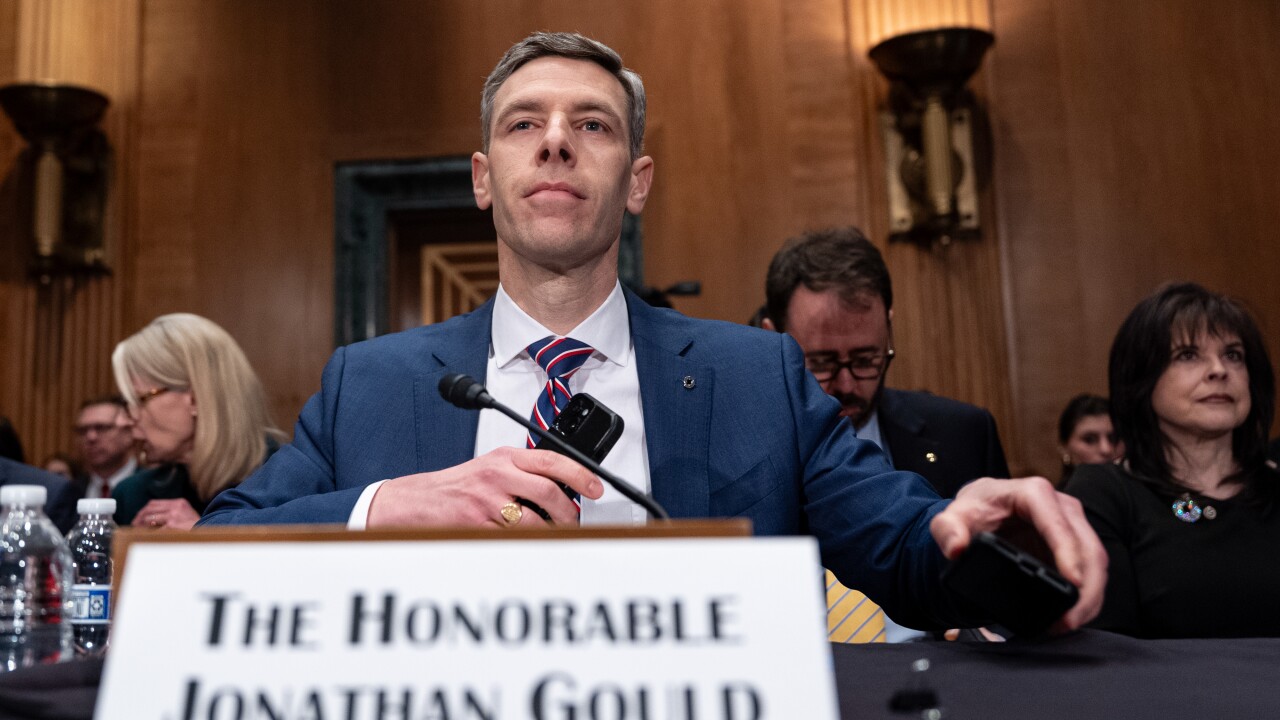Richard Cordray, the director of the Consumer Financial Protection Bureau, is the target of a new TV ad campaign that alleges he is courting potential donors for a run as governor of Ohio by enacting a plan that would benefit trial lawyers.
The ads appear to be the work of Lincoln Strategy Group, a political strategy firm based in Phoenix, which has been tied to allegations of voter fraud and accused of sending its operatives to public events featuring Cordray.
In one
-
The Consumer Financial Protection Bureau's proposal to limit the use of arbitration clauses came under attack Wednesday for potentially raising costs and liability for financial firms.
May 18 -
The American Action Network's provocative television commercial introduced millions of Americans to one of the most powerful and unaccountable government agencies in Washington.
November 18 -
Bankers are likely to cheer an ad from a conservative group portraying the CFPB as a Stalinist bureaucracy bent on denying consumers' credit. But the ad's over-the-top attack is already playing into the hands of Sen. Elizabeth Warren, the agency's founder.
November 10
The ad is referring to the CFPB's May
The ads generally seek to undermine the credibility of the agency and portray Cordray as using his role to further his political ambitions. Cordray's five-year term ends in mid-2018 and he is barred from campaigning for office while he serves as the CFPB's director.
Cordray, 57, has never said that he plans to run for governor of Ohio when current Gov. John Kasich's term expires in 2018. But there has been speculation that Cordray is considered a possible Democratic candidate.
"Director Cordray is solely focused on his work leading the federal Consumer Financial Protection Bureau," said CFPB spokesman Sam Gilford.
The ads are ostensibly the work of a group calling itself Protect America's Consumers and are running this month in Indiana, Montana, North Dakota, Ohio, West Virginia and the District of Columbia. The group says on its website that the "advertising blitz will expose the rotten activities of the CFPB."
Yet digging deeper into the group yields connections to another Republican political organization.
A search of the domain names found its website is owned by Dan Centinello, an executive vice president at Lincoln Strategy Group, a political strategy firm in Phoenix. Centinello worked on Mitt Romney's presidential campaign, among others, according to his bio on the firm's website.
Nathan Sproul, the founder of Lincoln Strategy Group,
There is some evidence that executives at Lincoln attempted to confront Cordray directly. During a May 5 field hearing on the arbitration proposal in Albuquerque, an audience member identified as Chuck Bowman asked Cordray if the plan was tied to his political ambitions. Consumer advocates, including Karl Frisch, an executive director at the progressive group Allied Progress, say Bowman is, in fact, Chuck Coolidge, a principal of Lincoln Strategy Group. Judging from a review of
"Director Cordray, wouldn't you agree with some of your panelists that this arbitration rule would increase class actions and pad the pockets of trial lawyers?" asked the bearded man at the hearing. "I would like to ask the governor if he plans on renouncing trial lawyer support for attorney general races or governor's race in Ohio."
Steve Gates, who is listed as a spokesman for Protect America's Consumers, could not be reached for comment.
Protect America's Consumers is listed as a 501(c)(4) organization, though it is not registered with the Internal Revenue Service, based on a search of exempt groups. 501(c)(4) nonprofits must be operated exclusively to promote social welfare and are prohibited from engaging in political activity, according to IRS guidelines. However, an exempt group can set up shop and start functioning while it is waiting for exempt status or even before it has applied for exemption.
Gates said in a press release on the group's website that the response to the ad campaign "to save the CFPB through reform has been hugely positive."
"Americans demand that people who are in charge of huge sums of their money answer to the people they elect," he said. "This is why America works."
Frisch, the Democratic strategist, has sought to rebut the allegations of Protect America's Consumers by creating his own opposing
Frisch said the founders of Protect America's Consumers are political operatives who have created campaigns for the coal industry and voter registration.
"If you think about what their current effort is, this is a dark-money group that is attacking the head of a federal agency for a campaign [for Ohio governor] that doesn't exist on donors that don't exist," Frisch said. "They're throwing everything they can at a wall and hoping something sticks."
Other TV ads allege that the CFPB's headquarters in Washington cost more than a Las Vegas casino, a longtime claim of GOP lawmakers based on a revamping of the agency's building after it took it over from the now-defunct Office of Thrift Supervision. (Cordray has said the building was a "dump" badly in need of repair, a view shared by many who visited it prior to its remodeling.)
The ads also say the bureau faces dozens of discrimination complaints by female and minority employees. Last year, American Banker





